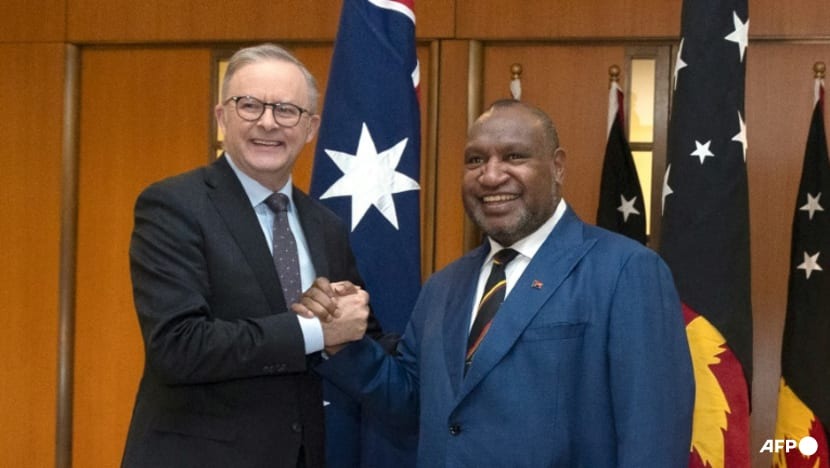Australia, Papua New Guinea announce security deal
07 December, 2023

Australia clinched a security deal with Papua New Guinea on Thursday (Dec 7), bolstering ties with a Pacific state that has been courted persistently by China.
Canberra pushed for a more substantive treaty earlier this year, but Papua New Guinea baulked because leaders feared it undermined the country's "sovereign rights".
Allies Australia and the United States have been on a diplomatic blitz to shore up their relationships in the South Pacific region.
They were jolted into action in April last year when Solomon Islands - Papua New Guinea's eastern neighbour - signed a secretive security pact with China.
Australia's salvaged agreement focuses on Papua New Guinea's domestic security, as stretched police struggle to contain arms trafficking, drug smuggling and tribal violence.
Papua New Guinea Prime Minister James Marape said the deal covered a "broad spectrum of security", including policing and support for the country's legal system. Australian Premier Anthony Albanese said it would promote "regional stability" in the Pacific. Papua New Guinea granted the United States "unimpeded" access to key naval bases, ports and airfields under a deal hammered out in May this year.
But there was a swift political backlash, with opponents concerned the former British colony was yielding too much influence to foreign powers.
POLITICAL BACKLASH
Australian Strategic Policy Institute analyst Euan Graham said the backlash had ultimately damaged Canberra's efforts.
"That's why it has taken until now, because of the political capital Marape used on the American agreement," he told AFP.
"He couldn't do a deal with Australia at the same time."
Marape and Albanese said earlier this year they were putting the finishing touches on a major bilateral security treaty.
But that agreement - which they had hoped to sign in June - started unravelling in the closing stages of negotiations.
By July, Marape was voicing concerns that unspecified clauses encroached on his country's "sovereign rights".
Thursday's revised agreement includes more training for Papua New Guinea's police, resources for the country's judges, and measures to tackle gender-based violence.
It also covers climate change, cyber security and disaster relief.
Perched less than 200km from Australia's northernmost border, Papua New Guinea is the largest and most populous state in Melanesia.
It is blessed with vast deposits of gas, gold, and minerals - and peers over some of the Pacific region's busiest shipping lanes.
"Because of its size, population, and geography it's always going to be a logical anchor point for a Pacific policy," said Graham.
CHINA'S DEEP LINKS
Australia scored a major strategic win last month when it unveiled a landmark agreement with climate-threatened Pacific nation Tuvalu.
That deal gives Australia a say in Tuvalu's future defence agreements, effectively blocking China from striking up a similar pact.
Papua New Guinea has been treading a more delicate path, eager to deal with Canberra and Washington without needlessly provoking Beijing.
"Our major foreign policy remains friends to all and enemies to none," Marape said on Thursday.
"It's never at the expense of relationships elsewhere."
China has been on its own Papua New Guinea charm offensive, pouring money into trade, real estate and infrastructure projects.
But Graham said that, so far, it had struggled to convert these links into anything of major military significance.
"China's economic links to Papua New Guinea's elite are now very deep, that's not going to disappear overnight," he said.
"But in defence terms, the penetration that China has made in Papua New Guinea is fairly shallow.
"They have been casting around for ports and airfield investments, but I think those are still quite speculative."
Source: www.channelnewsasia.com
TAG(s):
